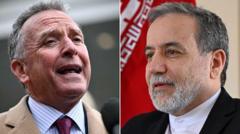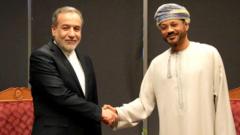With a series of political shifts and challenges lying ahead, Zelensky's ability to pivot away from his current authoritative stance might determine Ukraine's future support in its ongoing struggle against Russian aggression.
The Next Chapter for Zelensky: Adapting in an Evolving Global Landscape

The Next Chapter for Zelensky: Adapting in an Evolving Global Landscape
As Volodymyr Zelensky navigates the complex political terrain following his wartime leadership, the focus shifts to how he will adapt in a landscape influenced by changing U.S. policies and public opinion.
War has undeniably transformed Volodymyr Zelensky from the comedic prime minister of Ukraine to a resolute wartime leader. However, as political dynamics evolve, notably with the impending uncertainty of Donald Trump's potential second term, analysts suggest a need for Zelensky’s transformation once more.
Donald Trump, who previously dubbed Zelensky "the best salesman in history" due to his skill in securing international aid, represents an evolving narrative where U.S. support for Ukraine faces scrutiny from an increasingly diverse political landscape. The binary view of Ukraine as simply the oppressed victim and Russia as the oppressor becomes twisted as discussions shift towards balancing peace talks with military interests.
Early in the conflict, Zelensky’s strategy to maintain Ukraine’s visibility on the international stage proved pivotal, ensuring a steady flow of aid and military support. His calculated decision to address the Munich Security Conference prior to the invasion served to solidify international solidarity for Ukraine. Experts note that his effective communication, notably through consistent daily video addresses, maintained global awareness and support throughout 2022.
While initial successes in urging Western allies to supply weaponry demonstrated Zelensky's adeptness at international diplomacy, there has been criticism that he has not adapted his approach as circumstances have changed. The failed counter-offensive in 2023, coupled with increased fatigue among some U.S. Republicans regarding ongoing military support for Ukraine, has raised questions about his messaging. Analysts argue that what worked in the past is no longer sufficient in the current climate.
As Zelensky faces future negotiations and demands for adjustments, a recent encounter with Trump highlighted the complexities of their relationship. Despite assurances of camaraderie, tensions linger, characterized by past exchanges where blame was cast and accusations of disconnection were levied. This dynamic complicates Zelensky's position, as he must navigate not only Ukraine’s needs but also the intricate web of U.S.-Russia relations.
Despite internal pressures and calls for adaptability, many experts believe that Zelensky’s core beliefs and guides—embodied in his insistence on certain non-negotiable tenets—present an inherent challenge to evolving in line with international expectations. Political unity rallied around him post-Oval Office discussions hints at his strong domestic support amid foreign scrutiny, which underscores the difficult balance between yielding on diplomatic fronts while retaining national integrity.
Looking ahead, both analysts and political insiders maintain that, while Zelensky's adaptation is crucial against the backdrop of shifting U.S. positions, the path requires a careful distinction between necessary concessions and preserving Ukraine's sovereignty. As domestic sentiments react strongly to international challenges, how well he capitalizes on both public support and strategic negotiations remains central to Ukraine's continued resilience in a turbulent geopolitical landscape.























